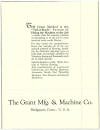
-



- Click on the image to
enlarge
AN
OVERVIEW AND HISTORY OF THE GRANT COMPANY
The Grant Company is a very different business from
when it first began in the mid to late 1800’s. But many of the same
principles and ideas from our founders remain as our outline for doing
business today and in the future. Grant has had a very interesting
past and has a very exciting future to look forward to.
Today the Grant Company is made up of a few
different operating businesses and several business units. The Grant
Manufacturing and Machine Company is the original company located in
Bridgeport Connecticut where the first riveting machine in the world
was developed and manufactured in the 1880’s. Riveting Systems, LLC dba/Grant Riveters was created in
2005.
The old Grant
Company, due to evolving times and the turn over of people in the
industry lost name recognition. Grant’s goal is to introduce new and
advanced products thru a name that says what we do “Grant
Riveters”. The other reason Grant Riveters was created was due to
current worldwide business trends and the outsourcing of
manufacturing. Bruce W. McNaughton, one of the managing members of Grant
Riveters, realized and understood that a new Grant machine design was
needed to survive in the new world market place. In 1996 Mr.
McNaughton started to design a new riveting machine product line and
reaching out to manufacturing sources worldwide. Over the next few
years the design was refined and trial machines were manufactured and
tested extensively. In 1999 the new Grant Riveters Company was
launched to produce and market its new world-class pneumatic orbital
riveter product line. In 1999 Bruce W. McNaughton with business
partners formed a business entity in Mumbai, India named
Grant International. Grant International, in combination with Grant
Riveters USA, started full production of the new Grant orbital riveter
and then shipped to the Bridgeport Connecticut facility for completion
and system integration.
Serving the manufacturing community, The Grant
Manufacturing and Machine Company has designed and built riveting,
metal forming and related assembly machines since the 1880’s.
Jeremiah Grant Kingsbury, an engineer employed as a
top engineer by Thomas Edison, founded Grant. He was charged with the
development of machines and manufacturing methods used to produce
Edison’s products.
The experience gained with Edison gave Kingsbury
incites into this country’s industrial future. It also fired his
desire to establish a company directed toward the design and building
of manufacturing tools and assembly equipment.
It was a period when America was rapidly becoming
the world’s manufacturing center, and in selecting a home for his new
company, J. Grant Kingsbury looked to Connecticut – particularly the
City of Bridgeport. The area had a number of well established
manufacturing concerns, tool and machine builders, and offered a
generous supply of labor skilled in the metalworking trades.
Without realizing the future implications, his new
company – which at first manufactured only tools and dies – kept
itself financially sound by servicing and building parts for the days
most common form of transportation, the bicycle. It is believed that
J. Grant Kingsbury’s father in the year 1860 invented and patented the
first hand tool that embossed a rivet that produced a pivoting joint.
As the company’s capabilities grew, it was an easy
step to become involved in the next major transportation boom … the
automobile. But this time it was not to service the product, but to
supply car builders with specialized machines and tools to solve parts
manufacturing and assembly problems. A broad range of custom machines
were designed and built. Drilling and milling equipment, machines and
tools for swaging, forging, and for the fastening and joining of many
materials. Grant is also written into history as one of the top 100
steam engine builders of the era. Grant produced many steam engines
for the marine industry. Grant also, in its vast historical past,
invented the first tire valve for the automobile and started the
Imperial Valve Company in Bridgeport, Connecticut. Grant has other
exciting memorable patented inventions like the first electric
vertical motor and the spark plug as we know it today. Grant was
responsible for implementing riveters on Henry Ford's first production
line in 1903 and was awarded the Bronze Medal at the Panama Pacific
International Exposition at the 1915 World's Fair in San Francisco for
the use of its riveters in the building of the Panama Canal from 1905
to 1915.
In 1904 the enterprise was incorporated as “The
Grant Manufacturing and Machine Company”. A broad range of custom
machines were designed and built and other product lines we enhanced.
Double-ended threading and cutting machines, drilling and milling
equipment, machines and tools for swaging, forging, and for the
fastening and joining of many materials. The machines were of such
variety, that in many of the photographs and sketches, which have
survived the years, it is almost impossible to determine what some of
them were used for or even what they did! Grant built fully automated
unmanned progressive die, feeding and riveting machines for the hinge
industry in 1894. These machines existed in full production running
three shifts a day until the year of 1996 when the Stanley Hardware
Company moved manufacturing overseas. These machines where such a
master piece that nobody in the world would or could duplicate them,
not even Grant since the design no longer existed.
Grant continued to focus on the
growing automotive industry, particularly in building assembly
machines. In 1905 – improving on existing processes - Kingsbury
invented and patented a rotary tool for spin-forming heads on rivets
and pins. Introducing his “noiseless rivet-spinning machine”. The
tool was composed of free-spinning shaped rollers mounted in a
rotating tool holder. When brought in contact with the shank end of a
rivet, pin or staking post, the compound motion of the tools
flow-formed a highly polished clinching head. Today we call this tool
“Twin-Spin” and use it for a wide range of assembly applications.
It was quickly discovered that by
using the same machine and simply changing tools, the machine could
roll metal over, curl it in or out, crimp, and fasten in a variety of
ways. The process still accommodates unique and precise jobs that
cannot be done with impact, radial or orbital riveting.
Shortly after introduction of
spin-roller forming – a process exclusive to Grant for many years –
the company acquired rights to manufacture a rotary vibrating impact
riveter. This was closely followed by development of a full line of
pneumatic riveting machines. While it is difficult to precisely
identify the date or the customer, it is highly probable that Grant
Manufacturing designed and built the first automatic rivet setting
machine used in assembling automotive brake linings.
In 1917 a long-time employee of
Kingsbury, William Black McNaughton, purchased control of Grant.
Wallace Bruce McNaughton, the son of William Black McNaughton, in turn
succeeded him. In 1996, Bruce William McNaughton, the current company
President of The Grant Manufacturing and Machine Company, continues the tradition of family management.
While an American patent was
issued for the orbital riveting tool in the 1922 (long before the
discovery claims of European manufacturers), it was not until the late
20’s that Grant designed and built orbital tools for use on the
“noiseless” rivet-setting machine. Orbital head forming combined
features of both the vibrating hammer-type and spin-roller riveters.
However, because the orbital tool was – and remains – far more costly
than tooling for either roller or conventional impact machines, it was
not widely used. This changed in the early 1960’s when government
established noise limitation levels and many hammer impact riveters
could not meet this limitation.
From the early 1900's to the late
1960's The Grant Manufacturing and Machine Company sold approximately
230,000 riveting systems worldwide. This is a great milestone for any
company in the world. Today The Grant Manufacturing and Machine
Company is recognized as Connecticut's Oldest Machine Tool Builder and
The World's Oldest Riveting Machine Tool Builder.
In 1996, Bruce W. McNaughton, the
current president decided that the machines of yesterday were no
longer what the world needed nor what they wanted. He developed a
new, more modern riveter that had fewer parts to replace. The parts
of yesterdays Grant machine were custom made only by the manufacturer,
Grant. Mr. McNaughton wanted a riveter that was as durable as the old
ones, that was fast and precise and one that would make replacing
parts easier for the customer. In the year 1999, the new orbital
riveter would be produced and marketed by Grant Assembly Technologies,
LLC. The Grant Manufacturing and
Machine Company still operates on its own supplying customers with
parts for their older machines that are still in use. Grant Riveters
builds the new modern riveter. The foundation of the riveter is built
in India then shipped to the Grant facility in Bridgeport, CT. There
the riveter is finalized. Spin-roller, straight-line or orbital
tooling can be used with all of these machines. Typical product
assembly applications include casters, hinges, motor components,
bearings, chain-link elements, a multitude of consumer appliances and
automotive accessories. In addition to these products currently
produced by Grant Riveters, Grant has developed other business units
to compliment our expertise in the riveting and press industry. These
business units include a new impact pneumatic riveter product line, a
new impact air over oil riveter product line, a new extensive air over
oil cylinder and integrated press product line and a portable C-frame
hydraulic riveter line for squeezing rivets in truck chassis and
frames.
Product improvement, process
innovation and new multi-functional automated and robotic assembly
systems are continuously being introduced by Grant Riveters. All are
direct descendants of the first spin-roller tool invented by J. Grant
Kingsbury in 1905. The process itself explains Grant’s maxim –
“Forming the Future …For American Industry”.
Grant products have always been
and will continue to be of the highest quality, and price-competitive
in the world marketplace.
Organizational Overview
The Grant Manufacturing and Machine
Company
·
Spare parts for all product lines.
·
Spare tooling for all product lines.
·
Fixtures and tooling for all new manufactured equipment.
·
Limited Services for all day-to-day business at the
Bridgeport, CT facility.
Grant Riveters
·
Pneumatic orbital
riveter manufacturing processes including casting, machining and
painting services.
·
Pneumatic orbital
riveter machine assembly process.
·
Spare tooling for new
product lines.
·
Spare parts for new
product lines.
·
Multi-process
integration in new orbital riveters.
·
Design and engineering
system integration services for all new product lines.
·
Consulting services
worldwide pertaining to the riveting and metal forming industry.
·
Contract orbital
riveting services to aerospace and government military suppliers.
·
Proto-typing services
for the prospective customer.
·
Management of system
integration services.
·
Management of all
business units worldwide.
·
Management of Sales
Representatives worldwide.
Grant International
·
Pneumatic orbital
riveter manufacturing processes including casting, machining and
painting services.
·
Pneumatic orbital
riveter machine assembly process.
·
Spare tooling for new product lines.
|






